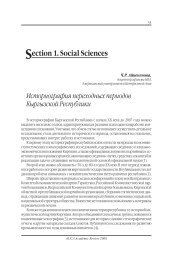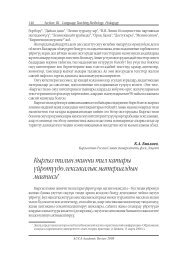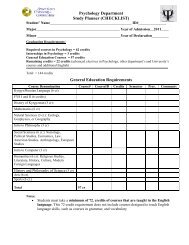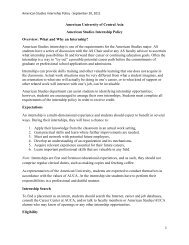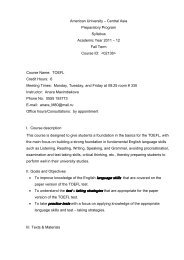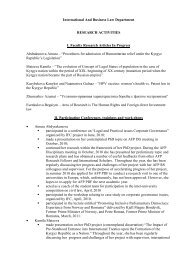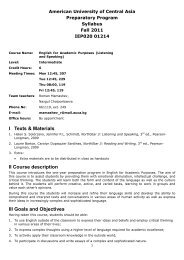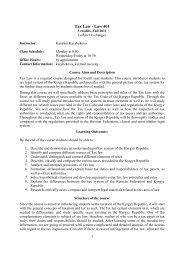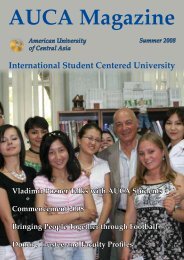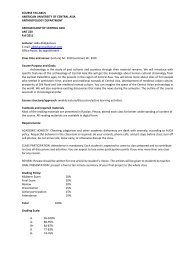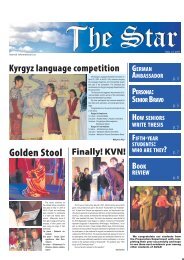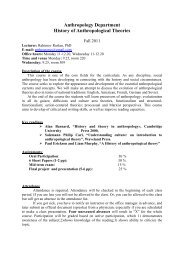INTRODUCTION TO DEVELOPMENT ANTHROPOLOGY Course ...
INTRODUCTION TO DEVELOPMENT ANTHROPOLOGY Course ...
INTRODUCTION TO DEVELOPMENT ANTHROPOLOGY Course ...
Create successful ePaper yourself
Turn your PDF publications into a flip-book with our unique Google optimized e-Paper software.
<strong>INTRODUCTION</strong> <strong>TO</strong> <strong>DEVELOPMENT</strong> <strong>ANTHROPOLOGY</strong><br />
<strong>Course</strong> Syllabus<br />
Time and venue: Monday, 14.10, r. 2/202 and Wednsday, 14.10, r. 1/311<br />
Instructor: Dr. Emil Nasritdinov (Office hours: Tuesday and Thursday, 12.30‐14.30) emilzn@gmail.com<br />
<strong>Course</strong> abstract<br />
The development effort has been going on a global scale for more than half a century by now involving the<br />
governments of developed and developing nations, bilateral and multilateral institutions, international and<br />
local non‐governmental organizations, and local communities in the attempt to improve the living conditions<br />
of people in the less fortunate corners of the world. The development narrative is now full of stories of<br />
success and failure. Many studies have been carried out on the analysis of development initiative and one of<br />
the main reasons of failures is seen in the standardized universal approach and projects that do not take into<br />
account the uniqueness of local cultural context. Anthropologists arrive at the scene as experts with the<br />
knowledge of local communities and local traditions. What makes such knowledge useful and how can<br />
anthropologists engage successfully in helping communities improve their lives and solve their problems are<br />
the main questions of this course.<br />
This course will introduce students to the field of development and to the role that anthropologists play in it.<br />
It will look at the history of development effort and evolution of its concept and will analyze major theories of<br />
development. It will review major directions of the development work, such as participatory development, use<br />
of indigenous knowledge, micro‐credit schemes, natural and cultural resources management, politics of<br />
development, etc. It will introduce students to the nature of development projects and main principles of<br />
working with the communities, donors and local governments. Finally, this course will introduce students to<br />
the development discourse in the context of Central Asia. Currently, Kyrgyzstan, due to favorable political<br />
climate, large numbers of international and local development organizations and thousands of realized<br />
development initiatives, can be seen almost like a development lab of Central Asia. Guest lecturers from<br />
development organizations will be invited. All in all, this course will be essential for anthropology students<br />
thinking of a career in applied anthropology and interested in the contemporary issues of developing nations.<br />
Assignments<br />
Attendance = 10%<br />
Participation = 20%<br />
Short analysis paper (10%) and presentation (10%) = 20%<br />
2 online assignments x 5% each = 10%<br />
Mid‐term exam = 20%<br />
Final Exam = 20%<br />
Attendance<br />
If you don’t miss classes, you automatically receive 10% for attendance. For each class missed without a<br />
reason ‐ you will lose 2% of your grade. If you miss 4 classes without a reason ‐ you automatically receive X for<br />
the course and we will see each other next year again. If you are sick you should inform our office manager<br />
before the class and then bring the note from your doctor. Without a call to the office manager and without a<br />
note, your absence will not be excused.<br />
Participation<br />
Participation is the discussion of readings. There will be 12 seminar classes where we will discuss texts.<br />
Questions for readings will be posted online at the e‐course system. For each class you will receive 2% if you<br />
participate and give evidence that you have read the text. If the majority of class is not prepared, we cancel<br />
the class and appoint a make‐up class. In some classes we will also have individual and group exercises, which<br />
will also count towards your participation.<br />
Short paper and presentation<br />
At the beginning of the course, two students will select a specific topic from the list and write a short paper (5<br />
pages each student) based on additional readings. You will then make a short (10‐15 minutes) joint<br />
presentation to the class. You should submit your paper at the same day when you make your presentation.<br />
All submissions including your power‐point presentation should be submitted online at the e‐course system.<br />
This is the only written submission you have to do in the entire semester, so late submissions will not be<br />
accepted, you will lose 10%. Similarly, if you do not make presentation on the day when it is scheduled, you
will not be given a second chance to do it and you will also lose 10%. On the day of your presentation you<br />
should come to class early and have it ready before class starts.<br />
Schedule of student presentations (pick one)<br />
1. Mon, Sep 12 – Modernization theory<br />
2. Wed, Sep 14 – Dependency theory<br />
3. Wed, Sep 21 – Human development and Millennium Development Goals<br />
4. Wed, Sep 28 – Culture and development<br />
5. Wed, Oct 5 – Post‐development<br />
6. Wed, Oct 26 – NGOs and development<br />
7. Wed, Nov 2 – Gender and development<br />
8. Thu, Nov 14 – Community participation in development<br />
9. Thu, Nov 21 – Sustainable development<br />
10. Thu, Nov 18 – Religious perspective on development<br />
Online assignments at the e‐course system<br />
There will be two assignments, which you will have to submit online at the e‐course system at the end of the<br />
first and third quarter of the course.<br />
Guest lectures<br />
Nearer to the end of semester we will invite representatives of various development organizations to talk to<br />
you about the development work they do in Kyrgyzstan. You are expected to be active during their<br />
presentations and ask questions. They are your potential employers in the future; so it is a good chance to<br />
make impression.<br />
Midterm and final exams<br />
You will have two exams this semester: one in the middle to cover the first half of the course material and one<br />
in the end to cover the second half. There will be two‐three essay questions and several short questions to<br />
work on in class. All questions will be based on readings and lecture materials. Questions for both exams will<br />
be posted each week at the moodle e‐course system.<br />
Readings for the course<br />
You have to borrow a course reader at the department and return it back when the course is finished. You will<br />
not be given a final grade until you return the reader. So, don’t loose it or you will have to make another copy.<br />
The reader is compiled from chapters of the following books:<br />
Black, M. (2007) The No‐Nonsense Guide to International Development, New Internationalist Publications<br />
Dichter, T.W. (2003) Despite Good Intentions: Why Development Assistance to the Third World Has Failed,<br />
University of Massachusetts Press<br />
Elliott, J. (2006) An Introduction to Sustainable Development, Routledge<br />
Isbister, J. (2001) Promises Not Kept: The Betrayal of Social Change in the Third World, Kumarian Press<br />
Mannan, M.A. (1989) Economic Development and Social Peace in Islam, Ta‐Ha Publishers<br />
Momsen, J. (2010) Gender and Development, Routledge<br />
Sachs, J.D. (2005) The End of Poverty: Economic Possibilities of Our Time, Penguin Books<br />
Additional course materials will be available at the Moodle system of the university available at:<br />
e‐course.auca.kg . Instructions on how to use the system and enrollment key for the course will be given to<br />
you later.<br />
Grading scale<br />
100‐96 = A<br />
95‐91 = A‐<br />
90‐86 = B+<br />
85‐81 = B<br />
80‐76 = B‐<br />
75‐71 = C+
70‐66 = C<br />
65‐61 = C‐<br />
60‐56 = D+<br />
55‐51 = D<br />
50‐46 = D‐<br />
45 and lower = F
Schedule of classes<br />
Week 1<br />
Mon, Aug 22 <strong>Course</strong> introduction (lecture)<br />
Wed, Aug 24 Global poverty (lecture)<br />
Week 2<br />
Mon, Aug 29 What is development? History of development (lecture)<br />
Wed, Aug 31 Independence Day, No classes<br />
Week 3<br />
Mon, Sep 5 Modernization theory (lecture)<br />
Wed, Sep 7 Marxism, Dependency and World Systems theories (lecture)<br />
Week 4<br />
Mon, Sep 12 Student presentation (Modernization)<br />
+ Discussion of reading #1 (Sachs, CH.1) & reading #2 (Dichter, Ch.2)<br />
Wed, Sep 14 Student presentation (Dependency) + Discussion of reading #3 (Isbister, Ch.2)<br />
Week 5<br />
Mon, Sep 19 Human development (lecture)<br />
Wed, Sep 21 Student presentation (Millennium Development Goals) + Discussion of reading #4 (Black,<br />
Ch. 4) + Online assignment #1<br />
Week 6<br />
Mon, Sep 26 Cultural turn in development (lecture)<br />
Wed, Sep 28 Student presentation (Culture and development) + Discussion of reading #5 (Allen &<br />
Thomas, Ch. 21)<br />
Week 7<br />
Mon, Oct 3 Alternative and Post‐Development (lecture)<br />
Wed, Oct 5 Student presentation (Post‐Development) + Discussion of reading #6 (Dichter, Ch.6)<br />
Week 8<br />
Mon, Oct 10 Development actors (lecture)<br />
Wed, Oct 12 Anthropology and development practice (lecture)<br />
Week 9<br />
Oct 17‐21 – Fall break – No classes<br />
Week 10<br />
Mon, Oct 24 Midterm exam<br />
Wed, Oct 26 Student presentations (UNDP; NGOs and development) + Discussion of reading #7<br />
(Dichter, Ch.3) & reading #8 (Putting anthropology to work)<br />
Week 10<br />
Mon, Oct 31 Gender and development (lecture)<br />
Wed, Nov 2 Student presentation (Gender) + Discussion of readings #9 (Momsen, Ch. 1)<br />
Week 11<br />
Mon, Nov 7 Day of October Socialist Revolution – No classes<br />
Wed, Nov 9 Community participation and development (lecture)<br />
Week 12<br />
Mon, Nov 14 Student presentation (Community participation) + Discussion of readings #10<br />
(Chambers, Ch. 4) + Online assignment #2<br />
Wed, Nov 16 Sustainable development<br />
Week 13<br />
Mon, Nov 21 Student presentation (Sustainable development)+Discussion of reading #11 (Elliot, Ch. 1)<br />
Wed, Nov 23 Development in religious perspective<br />
Week 14<br />
Mon, Nov 28 Student presentation (Relig. persp.) + Discussion of reading #12 (Mannan, Ch. 1‐3)<br />
Wed, Nov 30 Guest‐lecture<br />
Week 15<br />
Mon, Dec 5 Guest‐lecture<br />
Wed, Dec 7 Final Exam



